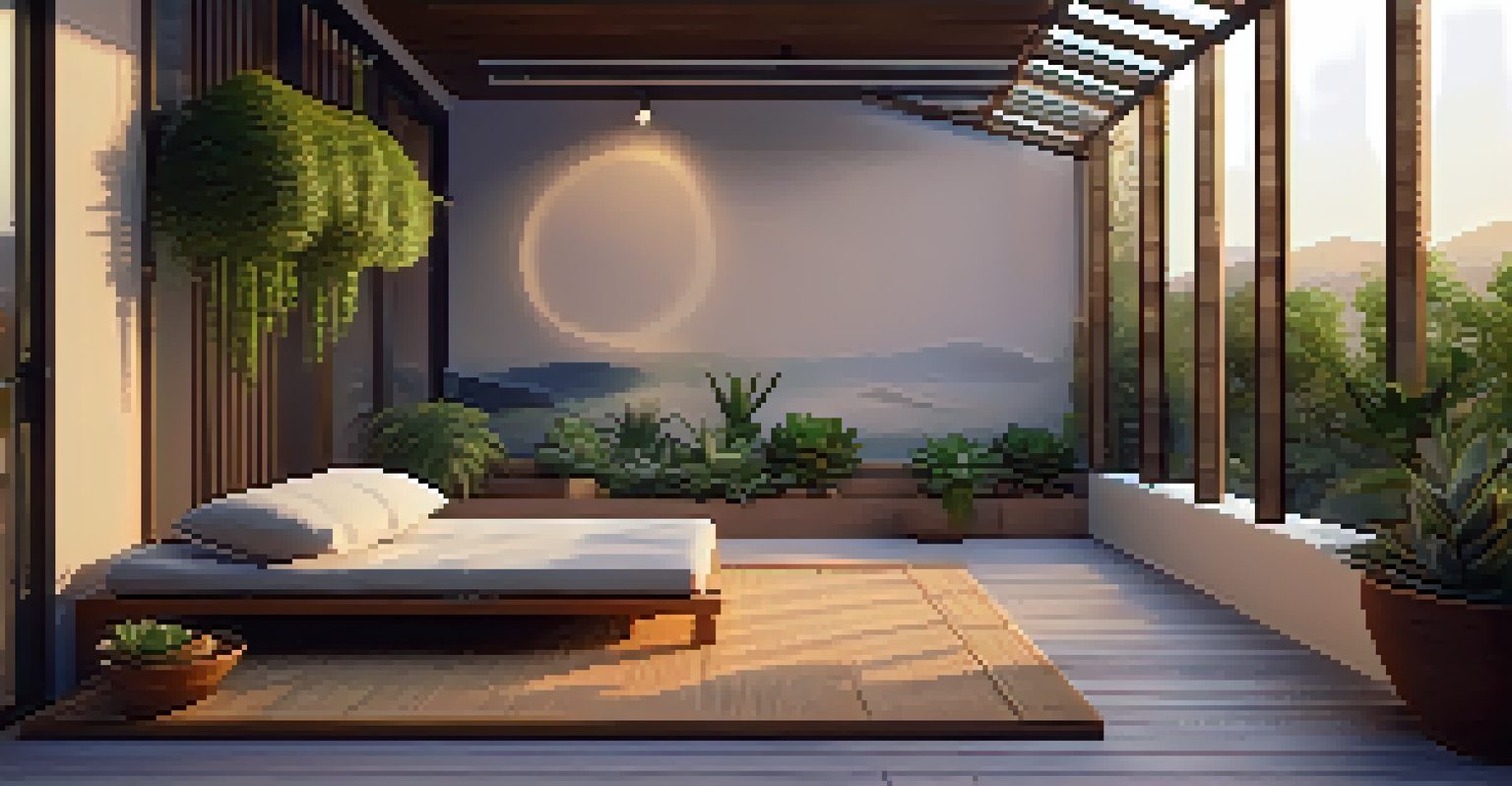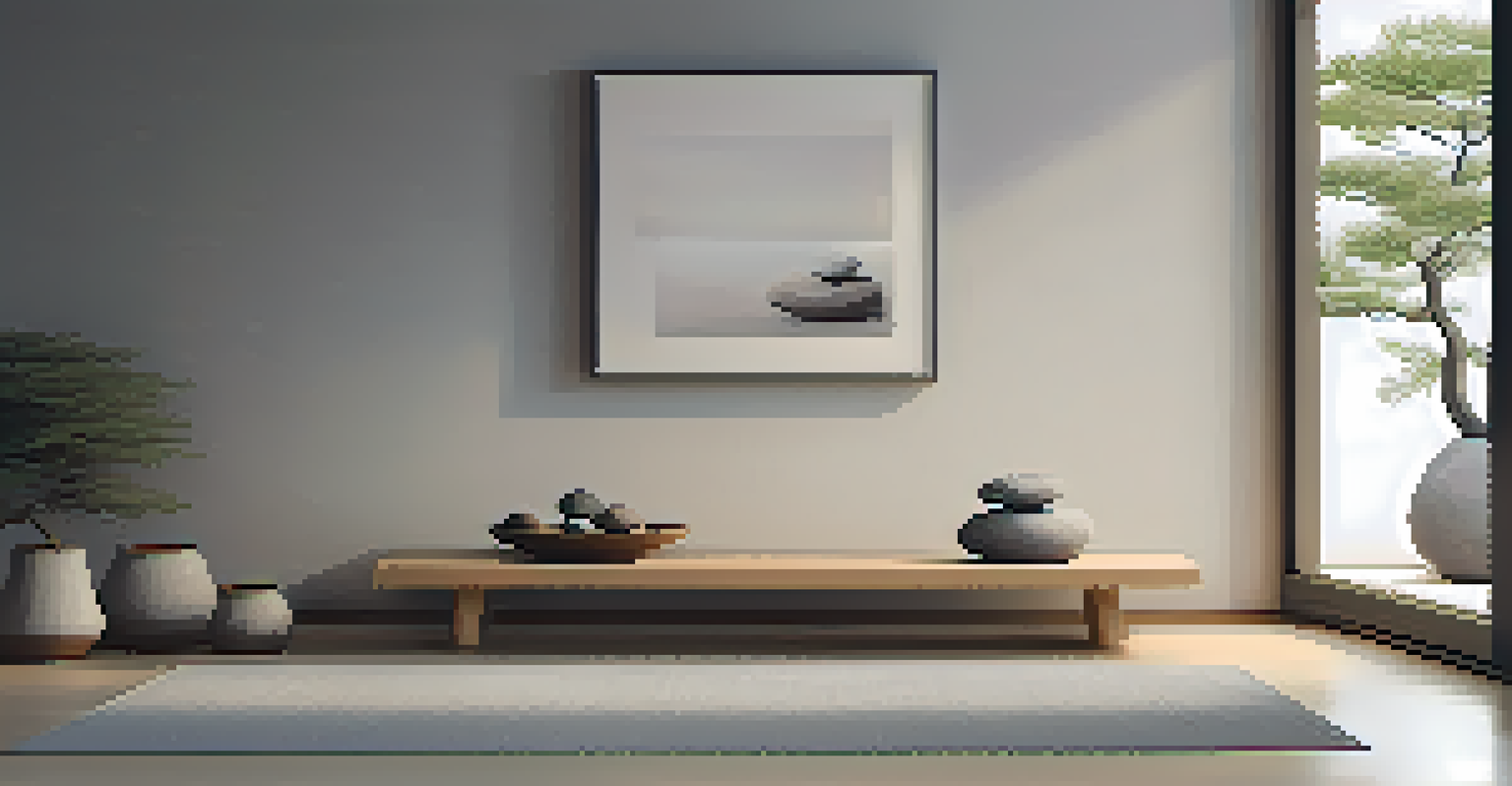Creating a Zen Space in a Small Home Environment

Understanding the Concept of a Zen Space
A Zen space is all about creating an environment that promotes relaxation and mindfulness. It’s a sanctuary where you can unwind and escape the chaos of daily life. Think of it as a personal oasis that encourages tranquility and focus.
The mind is everything. What you think you become.
The concept originates from Zen Buddhism, which emphasizes simplicity and meditation. However, you don’t need to be a monk to appreciate the benefits of a Zen space. It’s about making your home a reflection of peace and balance.
In a small home, this might seem challenging, but it’s entirely possible with the right approach. Let’s explore how you can cultivate this calming atmosphere, even in the tiniest of spaces.
Choosing the Right Location for Your Zen Space
The first step in creating your Zen space is selecting the right location. Look for a corner in your home that feels naturally peaceful, whether that's a cozy nook by a window or a quiet area away from distractions. It’s essential to choose a spot that feels inviting and safe.

If space is limited, consider transforming an underutilized area, such as a small balcony or a corner of your bedroom. A few plants and a comfortable chair can work wonders in making these areas feel serene.
Create a Peaceful Zen Space
A Zen space is designed to promote relaxation and mindfulness, serving as a personal oasis amidst daily chaos.
Remember, the goal is to create a space that signals relaxation. Once you have a location in mind, you can start adding elements that enhance its calming vibe.
Decluttering: The First Step to Zen
Decluttering is crucial when creating a Zen space, especially in a small home. A clutter-free environment helps clear your mind, allowing you to focus better on relaxation and mindfulness. Start by removing items that don’t bring you joy or serve a purpose.
Simplicity is the ultimate sophistication.
Consider a minimalist approach, keeping only what you need and love. Every object in your Zen space should have meaning, whether it’s a cherished memento or a simple plant that brings you joy.
As you declutter, you'll notice a lighter atmosphere that is conducive to peace. This foundational step paves the way for incorporating calming elements into your space.
Incorporating Natural Elements in Your Zen Space
Nature has an incredible way of grounding us, making it essential to incorporate natural elements into your Zen space. Consider adding plants, which not only improve air quality but also bring life and color to your environment. Even a small succulent can have a calming effect.
You might also want to include natural materials such as wood, stone, or bamboo. These materials evoke a sense of connection to the earth and enhance the overall aesthetic of your space.
Incorporate Natural Elements
Adding plants and natural materials can ground you and enhance the calming atmosphere of your Zen space.
By surrounding yourself with nature-inspired elements, you create a harmonious atmosphere that invites tranquility and relaxation.
Lighting: Setting the Mood for Your Zen Space
Lighting plays a significant role in creating a Zen atmosphere. Soft, warm lighting can help create a cozy and inviting ambiance. Consider using lamps with dimmers or candles to achieve this effect, as bright overhead lights can be jarring.
Natural light is also vital for a peaceful space, so try to maximize it by keeping windows clear and unobstructed. If you don’t have much natural light, opt for warm-toned bulbs that mimic sunlight.
Ultimately, the right lighting will help you feel more relaxed and centered, making it an essential aspect of your Zen space.
Mindfulness and Meditation in Your Zen Space
A Zen space is not just about aesthetics; it’s a place for mindfulness and meditation. Incorporate a comfortable cushion or mat where you can sit and practice meditation or deep breathing exercises. This dedicated area will encourage you to take time for yourself.
Consider setting a routine to visit your Zen space daily. Even just a few minutes of mindfulness can significantly reduce stress and enhance your overall well-being.
Maintain Your Zen Space
Regular upkeep of your Zen area ensures it remains a consistent source of peace and joy in your life.
By making mindfulness a regular practice in your Zen space, you'll foster a deeper sense of peace and purpose in your everyday life.
Personal Touches: Making Your Zen Space Unique
While creating a Zen space, it’s essential to infuse it with personal touches that resonate with you. This might include artwork, photographs, or meaningful objects that evoke positive memories. Surrounding yourself with items that hold significance can enhance feelings of comfort and belonging.
Consider your color palette as well; soft, neutral tones can be soothing, but don’t shy away from colors that inspire you. Choose hues that reflect your personality and create a sense of joy and peace.

Ultimately, your Zen space should be a reflection of who you are, making it a truly unique retreat from the hustle and bustle of life.
Maintaining Your Zen Space for Lasting Peace
Creating a Zen space is just the beginning; maintaining it is equally important. Regularly revisit your space to ensure it remains clutter-free and reflective of your current needs. Life changes, and so should your space.
Incorporate routines that reinforce the peaceful atmosphere, such as daily cleaning or rearranging elements to keep the energy flowing. This practice ensures your Zen space continues to inspire calm and clarity.
By committing to the upkeep of your Zen area, you'll find that it remains a consistent source of peace and joy in your small home.